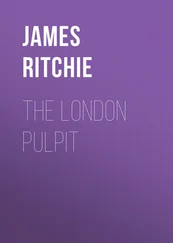But to return to the deaf and dumb. Inside this handsome church you will find any Tuesday evening about eight o’clock, some fifty or sixty of them sitting near the reading desk. Most of them are men and women in a humble position in life, engaged in various callings in the neighbourhood, more, however, in the east than the west. The desire to profit by such services seems on the increase. They have, for instance, at St. Lawrence, double the number they had, and the same may be said with regard to the services conducted morning and evening at the Polytechnic Institution. Nor are these services held in vain. Every year some are prepared for confirmation, and special celebrations of the Holy Communion are held for their benefit. To the ordinary attendants, including even such as have little need of an interpreter to explain the subject or to help them to follow the services in church, the committee report, “these services and lectures are profitable.” “I have felt it a great privilege to attend the services,” said one, “which have been a great comfort and benefit to me, and I hope I shall remember what I have heard” (it is to be presumed, by “heard,” the writer means what he saw: his language is conventional). “After I left school I felt so lost I could not hear what was said in churches, and now I am very happy in attending them.” In another way, also, the religious condition of these afflicted ones is kept in view. The Society employs missionaries engaged in house-to-house visitation. By these missionary agents, acting in concert with the parochial clergy, a personal acquaintance is maintained with the deaf and dumb scattered over London, and a most marked improvement in their character, conduct, and intelligence is the result of the supervision exercised. The society is also engaged in promoting the erection of a church for the deaf and dumb. For this purpose 550 l. have already been subscribed. In the Old Kent Road there is a Deaf and Dumb Asylum, and in other parts of the metropolis there are societies for their special benefit. Of course no mere outsider can give an account of a service with the deaf and dumb. It is easy to realize songs without words, but not so easy to realize public prayer and preaching in which no audible sound is heard, in which the service is conducted as it were by pantomime. As much as possible the rubric is observed, the deaf and dumb obey the instructions of the Prayer-book, and stand where standing is prescribed, and “sign” the response to the Lord’s Prayer, Creed, Confession, &c. As to the sermon, all that can be said is that it comes up to the Demosthenic standard for eloquence – action, action, action. Among the deaf and dumb the best preacher must be the best actor. Not merely are the fingers in constant requisition, but every part of the preacher’s face, as much as possible, is speaking all the time, either in the way of exhortation or entreaty. Great use, as we may imagine, is also made of the arms, and the body sways backward and forward as if to lend expression to such ideas as it may be the design of the teacher to convey. The great aim of these services is educational. They are intended to afford such an insight into the meaning and use of the Book of Prayer, that the deaf and dumb may be enabled to join intelligently in the public worship of the Church of England, and undoubtedly it is desirable that the terrible sense of isolation so natural under the circumstances should be got rid of, that the deaf and dumb should feel that they are part and parcel of the universal Church. Nevertheless there must be a deaf and dumb pulpit from which may flow the ever fructifying stream of Christian truth – a pulpit which the deaf and dumb may feel exists especially for them. Of this pulpit at present the Rev. Samuel Smith is the most distinguished orator, and as you watch him, though you cannot understand him, you cannot but wonder at his marvellous skill. Evidently his heart is in his work; equally evident is it that he has to complain of no wandering eyes. Every hearer is intent, many seem really devout and find the privilege one not lightly to be esteemed. The deep strain of the organ is not there, you miss the song of praise, you hear no penitential chant. From no living tongue falls the sweet promise of salvation and eternal life, from those sealed and silent lips escapes no audible prayer. Yet we know that and that He may be met with even among the deaf and dumb.
Конец ознакомительного фрагмента.
Текст предоставлен ООО «ЛитРес».
Прочитайте эту книгу целиком, купив полную легальную версию на ЛитРес.
Безопасно оплатить книгу можно банковской картой Visa, MasterCard, Maestro, со счета мобильного телефона, с платежного терминала, в салоне МТС или Связной, через PayPal, WebMoney, Яндекс.Деньги, QIWI Кошелек, бонусными картами или другим удобным Вам способом.












